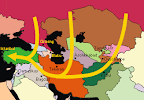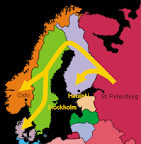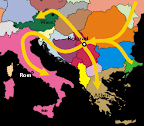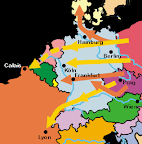What came over the Russians that they machinated the large war, we do not really know at my time yet. As the most frequent reason control of raw materials is stated. It concerned however not only the oil and gas, which are so important at your time, but also around coal, uranium, thorium and wood.
After Russia had recovered from the depression after the cold war at the end of the Aughts, it began to arm again. The KGB, which had attached good contacts to the military in the past, wins ever more power about the Russian military.

Control of the asian oil fields should be recovered. And soon also the oil fields in Iran, Iraq and Saudi Arabia again became interesting for Russia. Because old Russian plans planned already before the First World War a Russian rule in the so-called "center of the world". These plans should be carried out now.
When at 2014 the Near East began to rub out itself nearly completely, Russia took the chance and started its broad invasion.

First the Russian troops came over central Asia and the Caukasus to Iran and Iraq. When they could not take the oil fields, they continued to trek into Turkey. There were the first heavy battles between the Eurasec and NATO.

During this the first storm troops came to Finland, rolled over the country and then came over the north of Sweden. In Sweden there were likewise heavy battles between Sweden and Russian.

The Russian armored units, which had been deployed before in Turkey, continued to trek to Greece and to Belgrade. From Belgrade the troops divided and penetrated Romania, Hungary and Slovenia.
When in July 2014 the civil war in Italy reaches its climax, the Russians engage there. They only come until Neapel and then were pushed into defense by NATO.

During its urge three larger armored units come over Belarus and over Poland to Germany, the Ruhr district is their goal.
The upper troop wedge runs parallel to the Baltic and North Sea Coast, over Gdansk, connects with the Russian troops, who come from Scandinavia and are steering to the Netherlands.
The middle wedge steers directly to the Ruhr district and the lower wedge runs out of Czechia, north the Danube towards Lyons.
A confinement around the alps does not succeed, but they ignite several atom bombs over the Adria and the North Sea, in order to sink the NATO ships stationed there.
Nevertheless the Russians more and more are pushed into defense and flee in the direction of Moscow. The strategic nuclear weapons stationed in Czechia were ignited by them. Since then Prague is no more found on maps and Czechia is at my time still a restricted area.
In the spring of 2015 the Russians then start their last attack. They send elite troops over the Bering Sea to Alaska and try to penetrate the US. In the course of the attack the Russians bombard the US with their last nuclear weapons. Mainly the hail of bombs comes down on the region of the Great Lakes.
As retaliation the Americans send over two dozen neutron bombs to Russia and extinguish thereby a majority of the Russian cities.

By the war and after the war Russia changed clearly. At my time Russia is the area around the ruins of old Moscow and the rural regions therefore. Russia borders in the east, with the Ural on Siberia, in the north on the Republics of Karelia and Komi, in the west on the Baltic states, Belarus and the Ukraine, and in the south on Jugocaucasia and Kazakhstan.
Russia has neither its own administration still another capital. 30 years after the war it still isn't allowed to instruct a Army and the majority of the country is durably occupied by Asiatic and European troops. The largest part of the occupation troops consists of Chinese, Germans, Kazakhs and Finns. Sense of the occupation is the disputed "gentle extermination", i.e. the Russians aren't allowed to have more then one child per family and they are also not allowed to spread outside of Russia.
Thus its seems, as if there would be no more Russian people and country at the turn of the century. What will happen to the devastated and radioactively contaminated country is incalculable, but the remaining Russians, whom won't be there anymore, will most likely exactly like the Jews and Gypsies 50 years before, become a homeless and inadvertent people.

Keine Kommentare:
Kommentar veröffentlichen